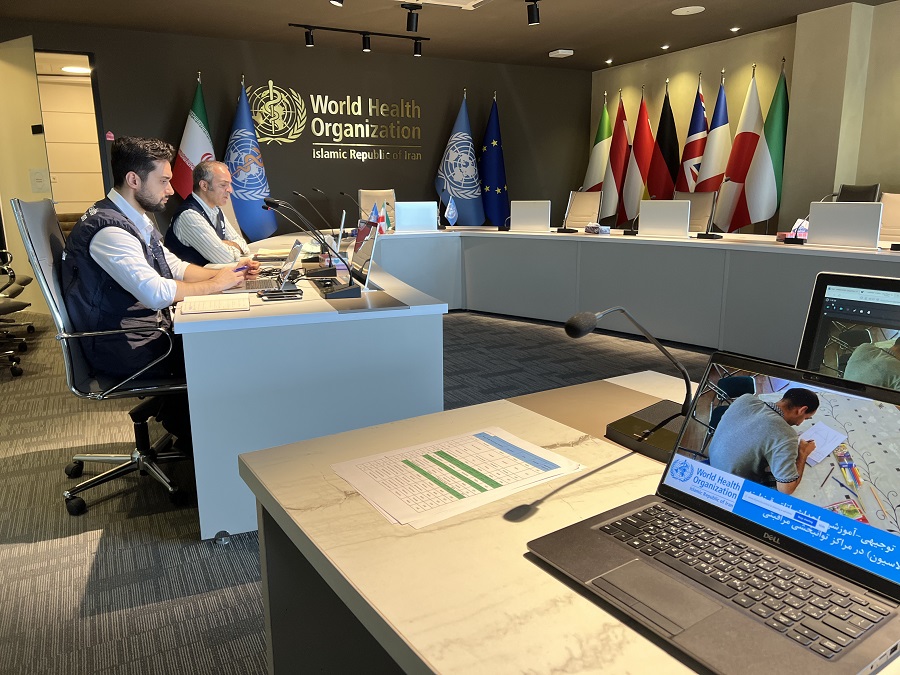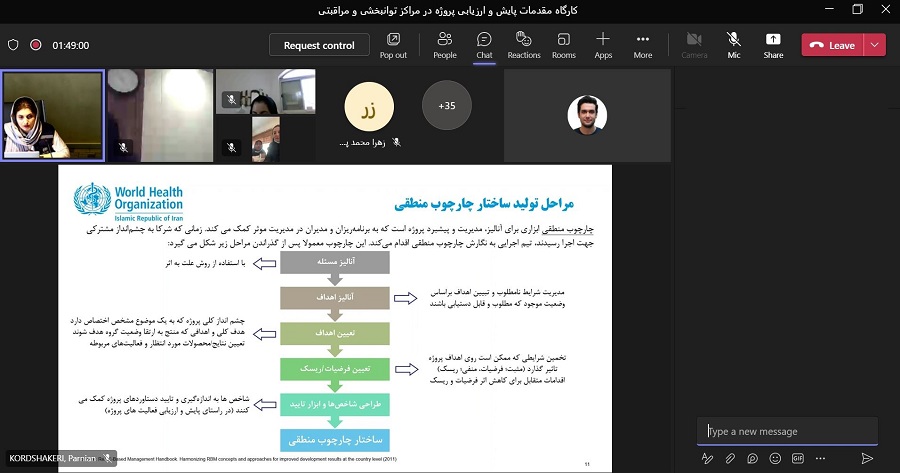 WHO project team conducting the virtual briefing session. Credit: WHO/Islamic Republic of Iran
WHO project team conducting the virtual briefing session. Credit: WHO/Islamic Republic of Iran
27 November 2022 – In line with progress towards results and to achieve the determined objectives of the ECHO project “Improving access to inclusive health care for elderly and people living with disabilities during the COVID-19 pandemic”, the World Health Organization (WHO) country office in the Islamic Republic of Iran, together with the State Welfare Organisation (SWO), organized and conducted several briefing and training sessions to build capacity and engage stakeholders and staff of long-term care facilities.
The project has been designed to reduce the risk and improve the response capacity in long-term care facilities. To maximize efficiency and ensure the achievement of results, the project team in WHO, in collaboration with the project steering committee, planned a rigorous capacity-building component whereby public and private institutions (long-term care facilities, national and provincial SWO experts) would be trained to contribute to the implementation, monitoring, and evaluation of the project. By 15 November 2022, 2 phases of the capacity-building activity had successfully been completed.
In the first phase, the staff of target facilities and national and provincial authorities from the SWO received online training on standards and preparation of isolation rooms, and the steps of project implementation in October 2022. These online sessions were conducted in 2 groups on Monday 10 October and Wednesday 12 October 2022, for facilities in Alborz, Ardabil, East Azerbaijan, Fars, Guilan, Hamedan, Isfahan, Kerman, Kermanshah, Khorasan Razavi, Qom, South Khorasan, Tehran and Yazd.
During the training, the requirements for establishing a standard isolation room, including room attributes and anteroom, bathroom, ventilation and air conditioning, necessary equipment, surfaces' condition, and facilities outside of the room were presented. Also, the essential requirements for effective and sustainable quarantine of patients with respiratory infections were discussed thoroughly. The process of preparing the designated room, verification modalities, repackaging and delivery of procured items to the 30 selected long-term care facilities in 14 provinces, and reporting and documentation requirements, and the timeline of activities and responsibilities were reviewed.
In the second phase, a virtual workshop entitled “Introduction to project monitoring and evaluation at long-term care facilities” was held for representatives from the SWO provincial offices and coordination and reporting focal points of long-term care facilities on 8 and 9 November 2022. This workshop was designed to train facility staff on result-based management and the effective operation of isolation rooms to facilitate the early quarantine of older persons and people living with disabilities.
 Monitoring and evaluation online workshop for the target SWO representatives and facility focal points. Credit: WHO/Islamic Republic of Iran
Monitoring and evaluation online workshop for the target SWO representatives and facility focal points. Credit: WHO/Islamic Republic of Iran
Participants gathered in 2 virtual sessions on 2 consecutive days to learn about result-based management, logical framework, project monitoring and evaluation and documentation and reporting against indicators. Throughout this highly interactive training, more than 50 participants engaged in multiple roundtables and group activities to brainstorm, discuss and practise modelled monitoring and evaluation.
The project capacity-building programme will continue to expand the practical knowledge and capacity of caregivers and service providers. The next phase is planned for December 2022, during which training courses will be provided on how to improve the quality of care and inclusive health care at the long-term care facility level via the tailored guidelines, standard operation procedures and monitoring tools.


